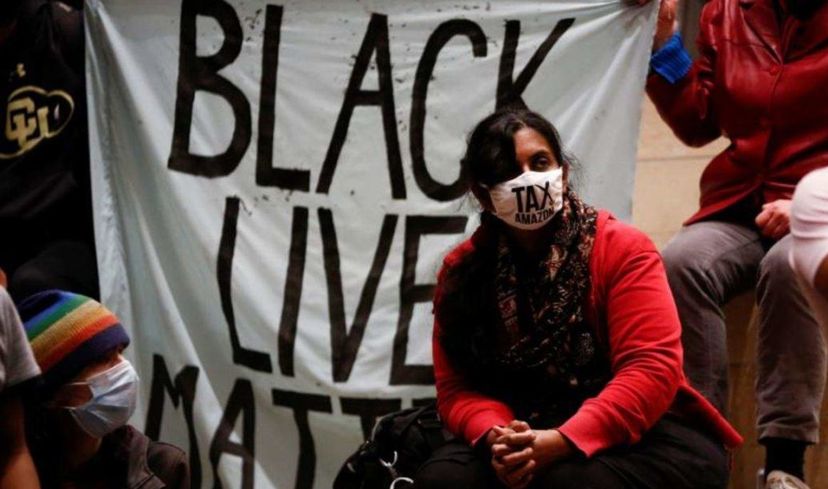Kshama Sawant is a Seattle City Councilmember and a member of Socialist Alternative in the US.
The reemergence of a socialist movement in the United States, and rapid growth of organizations like Democratic Socialists of America (DSA) and Socialist Alternative (SA), is of enormous historical importance. This is not only because Marxism is beginning to take root again on the hard soil of U.S. capitalism, but also because of the enormous challenges facing the working class in this period.
Capitalism is in the midst of its worst crisis in nearly a century, and it is a compound one — not only do we face the deadly disasters of COVID-19 and the economic collapse, but also the coming climate catastrophe. The disasters we’ve seen in the past year could become far worse unless socialists and the working class rise to the historic tasks in front of us.
The socialist left faces both challenges and opportunities. We need a mass working-class party, a stronger labor movement, and victorious struggles in our ongoing fight against the billionaire class. In my view, to move forward we need to advance the Marxist ideas that will be necessary to win both immediate gains in the present crisis and a final victory over capitalism’s exploitation and oppression.
Because of the urgency to build a wider socialist movement, I am now joining DSA, while remaining a member of Socialist Alternative. Other members of my organization are doing the same, as outlined in our article last December. Working class people are moving into struggle, and the socialist left will need to have patient debate to reach political clarity; I hope to contribute to this process in DSA and am excited to bring my experience as an openly Marxist elected representative.
Mass Movements Emerging
It is no accident that alongside the rebirth of socialist ideas have also risen mass protests and social movements. We saw the mass Women’s Marches, which while episodic and limited in their demands, included the largest single day of protest in U.S. history.
This summer the historic and transformational Black Lives Matter protests broke out in the wake of the brutal police murders of George Floyd and Breonna Taylor. The 2020 BLM protest movement was the largest in U.S. history, with an estimated 20 million participating. Our struggle against racism and police killings will be an ongoing fight in the coming years, as few key demands of our movement have been met thus far, much less systemic racism ended. A central question facing us — what strategies do socialists bring into this movement? There are of course competing ideas, such as a redevelopment of the ideas of black capitalism which, if they gain sway, will weaken the ability to effectively fight racism. I agree with Black Panther leader Fred Hampton, who said, “We don’t think you fight fire with fire best; we think you fight fire with water best. We’re going to fight racism not with racism, but we’re going to fight with solidarity. We say we’re not going to fight capitalism with black capitalism, but we’re going to fight it with socialism.”
We see the beginnings of a reemergence of a fighting labor movement, after decades of disastrous business unionist leadership which, while unfortunately still the dominant force, is beginning to be challenged. We saw this with the teacher strikes that swept “red states,” coming out of West Virginia, where a class conscious rank-and-file leadership developed and won a crucial victory that spread to other southern states and beyond. And it must be said that the WV teachers won their historic strike only because they exposed the insider deal of the higher-up union officials, rejected that deal, and kept on fighting.
We see young people at the forefront of all these movements, including of course the historic climate protests in 2019.
Today, working people around the country are watching the incredible organizing of workers in Bessemer, Alabama, fighting to win a first union at Amazon. A victory in this struggle could send shockwaves around the country and enormously push forward the necessary process to rebuild a fighting labor movement. It comes at a time when billionaires, like former Amazon CEO Jeff Bezos, have made more than $1.1 trillion off the pandemic as working people face unsafe conditions, mass unemployment, and mountains of debt.
Along with these steps forward, important debates have developed in the emerging socialist and workers’ movement and we have come under increased pressures. We already see fierce attacks on our movement from the outside, particularly from Democratic Party leaders. In the wake of the November elections, Congresswoman Abigail Spanberger emphatically blamed the loss of seats in the House on left politics, telling Democratic Party members: “Don’t say socialism ever again.” Much worse has no doubt been said behind closed doors. We should have no illusions that the corporate Democratic Party, with Biden in the White House, will hesitate to ramp up its attacks on socialists and working class movements, particularly in the midst of this honeymoon of illusions in the new administration and with so many fearful to challenge them. Biden and the Democratic Party are forced to carry out some stimulus spending and other measures to stave off the collapse of their system, but will always seek to make the working class pay for the crisis.
In Seattle, we see the right-wing recall campaign against my council office, which in essence is an attempt by big business and the political establishment to overturn not only our democratic election but also our movement’s many victories for working people and marginalized communities. If successful it will be used as a springboard for further attacks on the left, not just in Seattle but nationally, and that’s why it’s crucial we defeat it.
We will need to stand up against attacks wherever we encounter them, whether in mass movements, in labor, in election campaigns, or in the socialist movement itself. Whether or not socialists do so is not a matter of abstract principle, it can decide the outcome of key struggles. The socialist movement in the past has unfortunately been derailed many, many times by a failure to stand up against pro-establishment ideas and forces, a desire to get along with powerful “progressive” individuals, a lack of clarity about Marxist ideas, and by the influence of careerists within our ranks.
Principled Unity
Unity in the socialist movement, on a principled basis, will be crucial. As we engage in serious debates, and sometimes sharp ones, about how we can fight back and how we can bring effective strategies and tactics into the emerging struggles, to push them forward and help lead them to victory.
As some reading this will no doubt know, I am a longtime member of Socialist Alternative, and was elected as an open socialist in 2013 before Bernie Sanders’ campaigns for president or the elections of Squad members like AOC. In Seattle, we have used our elected office as a lever for the working class and marginalized communities to build movements to win historic victories.
The victory of making Seattle the first major city to pass a $15 minimum wage, was based on a socialist, class struggle strategy — on building mass movements, not on building relationships with progressive Democrats or NGO leaders. Rather than negotiating with the city’s establishment, we organized relentlessly to build the strongest possible force for $15/hr. We launched the 15 Now campaign and coalition, which overcame not only the vicious opposition of big business and the corporate Democrats, but also the cautious instincts of the key labor leaders who did not want to clash with the establishment. SA and 15 Now campaign organized a series of mass democratically run conferences, launched “neighborhood action groups,” held marches, and then democratically decided to file a grassroots ballot initiative so that we could take the issue to voters if Democratic City Councilmembers failed to act.
We have used this same class struggle strategy to win a series of major victories in Seattle, from last year’s Amazon Tax to fund affordable housing and Green New Deal programs to landmark renters rights laws to a first-in-nation ban on police use of tear gas, rubber bullets, and other so called “crowd control weapons” last year. Many DSA members have made major contributions to these struggles.
But while these are important victories, the challenges facing our class are enormous, and we have to raise our sights to what is needed — winning transformative change on a national and global scale and to fight for an end to capitalism and for a socialist world. Immediate questions face us regarding the platform popularized by Bernie Sanders’ campaigns and the wider socialist movement.
How do we fight for and win Medicare for All, a Green New Deal, a federal $15 minimum wage, the cancellation of student debt, and an end to police brutality and systemic racism? We have won enormous support for demands, but without a socialist strategy they could also tragically remain mere slogans. What is the best way to defeat the opposition of the ruling class and its representatives in both parties to push forward in the fight for $15, for example? AOC pushed back on the call to #ForceTheVote for Medicare for All saying we should focus on “winnable” demands like a federal $15 minimum wage. Now $15 is being abandoned by Biden, who privately told a group of governors and mayors last week that the $15 minimum wage hike likely isn’t happening.
I think the experience of the socialist movement in Seattle in recent years speaks volumes to these questions, and we need to bring that experience forward into these national struggles. We will need to apply this on a far larger scale — to build powerful movements of millions of people behind a socialist strategy to win these transformative demands.
If socialists don’t put forward clear strategies and tactics, and instead the Squad and other leaders continue to hesitate to go head-to-head with the Democratic Party to avoid a clash, we will lose. If socialists don’t build powerful and fearless movements for a federal $15 minimum wage, Medicare for All, and a Green New Deal, the working class will look elsewhere for leadership.
We will not defeat the dangerous rise of right populism and the far right in the U.S. and globally, if we don’t build a mass left alternative. Because while Trump is gone, Trumpism is alive and well and can grow rapidly under the current administration as Biden backs away from his progressive promises and defends the interests of big business.
There is a long history of multi-tendency organizations in the socialist movement. DSA is now the second largest socialist organization in U.S. history, and present day expression of “big tent” socialism, in which some political trends identify as Marxist (with differing interpretations) and some do not. SA is explicitly a revolutionary, internationalist, Marxist organization that is part of International Socialist Alternative, which has sister organizations in 30 countries around the world.
I believe the socialist movement needs both kinds of organizations, and so I am excited to be a member of both SA and DSA.
Debates in the Socialist Movement
There are important debates taking place right now in Seattle DSA as well as nationally. Recently, in a discussion about Seattle DSA’s platform, some leaders of one caucus in the organization argued against the inclusion of a call for democratic public ownership of big energy corporations. While I was not present for that debate, I was very disappointed to hear of the vote to not include this key point. I think it is something the local chapter should revisit. The call for democratic public ownership of big corporations has long been absolutely central to socialist ideas, and for good reason. And in the case of the big energy corporations, without democratic workers’ control we have no hope of avoiding climate disaster. We saw this brutally exposed earlier this month with the collapse of Texas’s profit-driven, deregulated energy grid.
The goal of Marxists, of course, is not just ownership of one corporation or another but of the commanding heights of the economy as a whole, and for a rationally planned, sustainable socialist economy run democratically by workers themselves. We know capitalism can never be made to work in the interests of working people, marginalized communities, or the planet. It is a system of crisis, and one which is rapidly taking human civilization over a cliff.
As Marxists, we are fighting for a complete end to this system and its repressive state — which is not a neutral or reformable entity but in essence a violent apparatus of “bodies of armed men,” including of course racist police forces. Instead we need to build a classless society based on solidarity and equality, with an economy run and democratically planned, where there is no capitalist class that can steal the wealth created by workers.
The question of democratic public ownership is a crucial one and those who argue against it need to explain if they think capitalism can be reformed.
I believe socialists also need a discussion nationally about how to build a new party for working people in the U.S., because we need a much broader organization of the working class beyond the socialist left. Support for a third party is at its highest point in the history of polling, according to a new Gallup poll. And there is real urgency, because if we do not build a party for working people, the coming sellouts of the Democratic Party on behalf of big business will give further impetus to the growth of the far right, in the absence of any left alternative.
Building a new mass party will not be easy but it is absolutely necessary because the Democratic Party is under the firm grip of the capitalist class. The notion popularized by a section of the left is that socialists can “take the party over.” But this represents a dire underestimation of both the resistance of the establishment and the fact that the party is completely undemocratic and there are no mechanisms to take it over.
We saw what Democratic Party leaders were prepared to do to stop Bernie Sanders and his call for a “political revolution” (twice!). We also saw just how firmly they control all the levers of power within the party.
We have seen up close in Seattle all the rotten tactics of the city’s establishment in defense of Amazon and big business, alongside the attacks on our movements like those against Black Lives Matter last summer. We see now how the Democrats in both Seattle and Olympia are in lock step in their efforts to undermine or phase out the Amazon Tax.
I believe our movement must strive to discuss our differences in a comradely way based on the issues. We must seek to find political clarity and agreement where possible, basing ourselves always on the needs of the working class and marginalized communities and on how we can most effectively build our movements.
I look forward to these coming discussions, in Seattle and nationally, as we strive to take up the historic challenges facing us. We must work together with urgency in this period of profound crisis, to fight for transformative change, and to raise the consciousness and confidence of our class in the struggle for a different kind of society.




